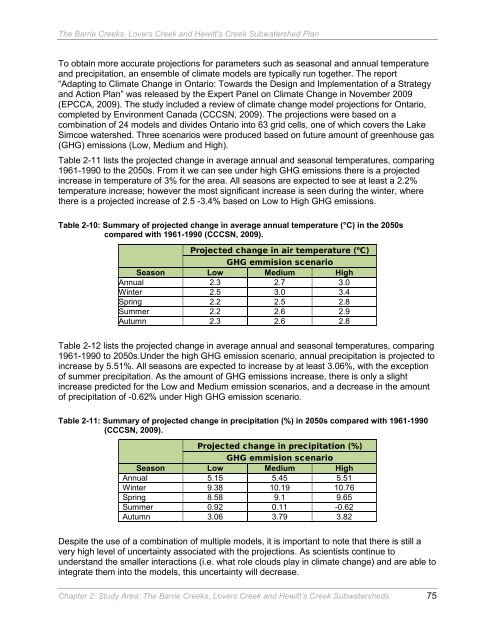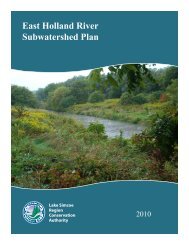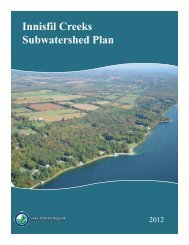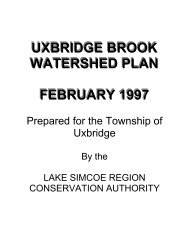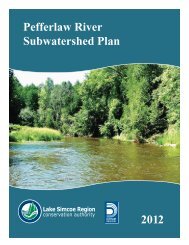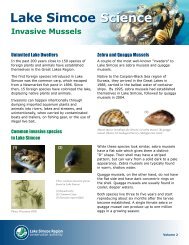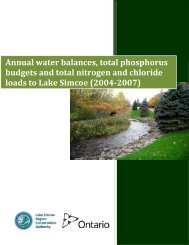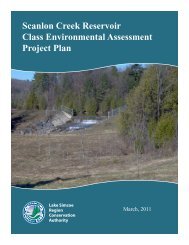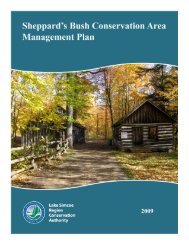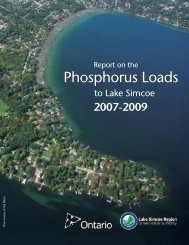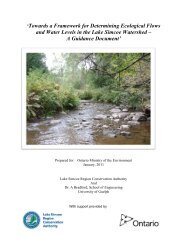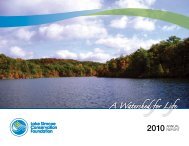- Page 1 and 2:
Barrie Creeks, Lovers Creek, and He
- Page 3 and 4:
Acknowledgements The Barrie Creeks,
- Page 5 and 6:
• East of the Barrie Creeks subwa
- Page 7 and 8:
Fish Habitat -Fish communities in t
- Page 9 and 10:
Table of Contents TABLE OF CONTENTS
- Page 11 and 12:
3.5.4 Water Temperature - thermal d
- Page 13 and 14:
5.3.11 Climate Change 237 5.4 ASSES
- Page 15 and 16:
6.5.10 Improving data management 31
- Page 17 and 18:
LIST OF FIGURES CHAPTER 1 Figure 1-
- Page 19 and 20:
Figure 2-34: Annual precipitation (
- Page 21 and 22:
CHAPTER 4 Figure 4-1: Hydrologic cy
- Page 23 and 24:
Figure 5-11: Pathways by which impe
- Page 25 and 26:
Figure 7-11: Riparian area with app
- Page 27 and 28:
Table 3-4: Surface water quality co
- Page 29 and 30:
CHAPTER 5 Table 5-1: Fish species c
- Page 31 and 32:
The Barrie Creeks, Lovers Creek and
- Page 33 and 34:
The Barrie Creeks, Lovers Creek and
- Page 35 and 36:
The Barrie Creeks, Lovers Creek and
- Page 37 and 38:
The Barrie Creeks, Lovers Creek and
- Page 39 and 40:
The Barrie Creeks, Lovers Creek and
- Page 41 and 42:
The Barrie Creeks, Lovers Creek and
- Page 43 and 44:
The Barrie Creeks, Lovers Creek and
- Page 45 and 46:
Creek ANNE ST N BAYFIELD ST N LINE
- Page 47 and 48:
The Barrie Creeks, Lovers Creek and
- Page 49 and 50:
The Barrie Creeks, Lovers Creek and
- Page 51 and 52:
The Barrie Creeks, Lovers Creek and
- Page 53 and 54: The Barrie Creeks, Lovers Creek and
- Page 55 and 56: The Barrie Creeks, Lovers Creek and
- Page 57 and 58: The Barrie Creeks, Lovers Creek and
- Page 59 and 60: The Barrie Creeks, Lovers Creek and
- Page 61 and 62: The Barrie Creeks, Lovers Creek and
- Page 63 and 64: The Barrie Creeks, Lovers Creek and
- Page 65 and 66: ANNE ST N BAYFIELD ST N LINE 1 S OR
- Page 67 and 68: The Barrie Creeks, Lovers Creek and
- Page 69 and 70: ANNE ST N BAYFIELD ST N LINE 1 S OR
- Page 71 and 72: ANNE ST N BAYFIELD ST N LINE 1 S OR
- Page 73 and 74: ANNE ST N BAYFIELD ST N LINE 1 S OR
- Page 75 and 76: The Barrie Creeks, Lovers Creek and
- Page 77 and 78: The Barrie Creeks, Lovers Creek and
- Page 79 and 80: The Barrie Creeks, Lovers Creek and
- Page 81 and 82: The Barrie Creeks, Lovers Creek and
- Page 83 and 84: The Barrie Creeks, Lovers Creek and
- Page 85 and 86: ANNE ST N BAYFIELD ST N LINE 1 S OR
- Page 87 and 88: The Barrie Creeks, Lovers Creek and
- Page 89 and 90: The Barrie Creeks, Lovers Creek and
- Page 91 and 92: The Barrie Creeks, Lovers Creek and
- Page 93 and 94: The Barrie Creeks, Lovers Creek and
- Page 95 and 96: The Barrie Creeks, Lovers Creek and
- Page 97 and 98: The Barrie Creeks, Lovers Creek and
- Page 99 and 100: FERNDALE DR N ANNE ST N BAYFIELD ST
- Page 101 and 102: The Barrie Creeks, Lovers Creek and
- Page 103: The Barrie Creeks, Lovers Creek and
- Page 107 and 108: The Barrie Creeks, Lovers Creek and
- Page 109 and 110: The Barrie Creeks, Lovers Creek and
- Page 111 and 112: The Barrie Creeks, Lovers Creek and
- Page 113 and 114: The Barrie Creeks, Lovers Creek and
- Page 115 and 116: The Barrie Creeks, Lovers Creek and
- Page 117 and 118: The Barrie Creeks, Lovers Creek and
- Page 119 and 120: The Barrie Creeks, Lovers Creek and
- Page 121 and 122: The Barrie Creeks, Lovers Creek and
- Page 123 and 124: The Barrie Creeks, Lovers Creek and
- Page 125 and 126: The Barrie Creeks, Lovers Creek and
- Page 127 and 128: The Barrie Creeks, Lovers Creek and
- Page 129 and 130: The Barrie Creeks, Lovers Creek and
- Page 131 and 132: The Barrie Creeks, Lovers Creek and
- Page 133 and 134: The Barrie Creeks, Lovers Creek and
- Page 135 and 136: The Barrie Creeks, Lovers Creek and
- Page 137 and 138: The Barrie Creeks, Lovers Creek and
- Page 139 and 140: The Barrie Creeks, Lovers Creek and
- Page 141 and 142: The Barrie Creeks, Lovers Creek and
- Page 143 and 144: The Barrie Creeks, Lovers Creek and
- Page 145 and 146: The Barrie Creeks, Lovers Creek and
- Page 147 and 148: The Barrie Creeks, Lovers Creek and
- Page 149 and 150: FERNDALE DR N SUNNIDALE RD ANNE ST
- Page 151 and 152: The Barrie Creeks, Lovers Creek and
- Page 153 and 154: The Barrie Creeks, Lovers Creek and
- Page 155 and 156:
The Barrie Creeks, Lovers Creek and
- Page 157 and 158:
The Barrie Creeks, Lovers Creek and
- Page 159 and 160:
The Barrie Creeks, Lovers Creek and
- Page 161 and 162:
The Barrie Creeks, Lovers Creek and
- Page 163 and 164:
The Barrie Creeks, Lovers Creek and
- Page 165 and 166:
The Barrie Creeks, Lovers Creek and
- Page 167 and 168:
The Barrie Creeks, Lovers Creek and
- Page 169 and 170:
The Barrie Creeks, Lovers Creek and
- Page 171 and 172:
The Barrie Creeks, Lovers Creek and
- Page 173 and 174:
The Barrie Creeks, Lovers Creek and
- Page 175 and 176:
The Barrie Creeks, Lovers Creek and
- Page 177 and 178:
The Barrie Creeks, Lovers Creek and
- Page 179 and 180:
The Barrie Creeks, Lovers Creek and
- Page 181 and 182:
The Barrie Creeks, Lovers Creek and
- Page 183 and 184:
The Barrie Creeks, Lovers Creek and
- Page 185 and 186:
ANNE ST N BAYFIELD ST N LINE 1 S OR
- Page 187 and 188:
The Barrie Creeks, Lovers Creek and
- Page 189 and 190:
FERNDALE DR N ANNE ST N BAYFIELD ST
- Page 191 and 192:
The Barrie Creeks, Lovers Creek and
- Page 193 and 194:
The Barrie Creeks, Lovers Creek and
- Page 195 and 196:
FERNDALE DR N ANNE ST N BAYFIELD ST
- Page 197 and 198:
The Barrie Creeks, Lovers Creek and
- Page 199 and 200:
The Barrie Creeks, Lovers Creek and
- Page 201 and 202:
The Barrie Creeks, Lovers Creek and
- Page 203 and 204:
The Barrie Creeks, Lovers Creek and
- Page 205 and 206:
The Barrie Creeks, Lovers Creek and
- Page 207 and 208:
The Barrie Creeks, Lovers Creek and
- Page 209 and 210:
The Barrie Creeks, Lovers Creek and
- Page 211 and 212:
The Barrie Creeks, Lovers Creek and
- Page 213 and 214:
The Barrie Creeks, Lovers Creek and
- Page 215 and 216:
The Barrie Creeks, Lovers Creek and
- Page 217 and 218:
FERNDALE DR N SUNNIDALE RD ANNE ST
- Page 219 and 220:
The Barrie Creeks, Lovers Creek and
- Page 221 and 222:
FERNDALE DR N ANNE ST N BAYFIELD ST
- Page 223 and 224:
The Barrie Creeks, Lovers Creek and
- Page 225 and 226:
The Barrie Creeks, Lovers Creek and
- Page 227 and 228:
The Barrie Creeks, Lovers Creek and
- Page 229 and 230:
The Barrie Creeks, Lovers Creek and
- Page 231 and 232:
The Barrie Creeks, Lovers Creek and
- Page 233 and 234:
The Barrie Creeks, Lovers Creek and
- Page 235 and 236:
The Barrie Creeks, Lovers Creek and
- Page 237 and 238:
The Barrie Creeks, Lovers Creek and
- Page 239 and 240:
The Barrie Creeks, Lovers Creek and
- Page 241 and 242:
FERNDALE DR N SUNNIDALE RD ANNE ST
- Page 243 and 244:
The Barrie Creeks, Lovers Creek and
- Page 245 and 246:
FERNDALE DR N SUNNIDALE RD ANNE ST
- Page 247 and 248:
The Barrie Creeks, Lovers Creek and
- Page 249 and 250:
The Barrie Creeks, Lovers Creek and
- Page 251 and 252:
The Barrie Creeks, Lovers Creek and
- Page 253 and 254:
The Barrie Creeks, Lovers Creek and
- Page 255 and 256:
FERNDALE DR N SUNNIDALE RD ANNE ST
- Page 257 and 258:
FERNDALE DR N SUNNIDALE RD ANNE ST
- Page 259 and 260:
The Barrie Creeks, Lovers Creek and
- Page 261 and 262:
ANNE ST N BAYFIELD ST N LINE 1 S OR
- Page 263 and 264:
FERNDALE DR N SUNNIDALE RD ANNE ST
- Page 265 and 266:
The Barrie Creeks, Lovers Creek and
- Page 267 and 268:
The Barrie Creeks, Lovers Creek and
- Page 269 and 270:
The Barrie Creeks, Lovers Creek and
- Page 271 and 272:
The Barrie Creeks, Lovers Creek and
- Page 273 and 274:
The Barrie Creeks, Lovers Creek and
- Page 275 and 276:
The Barrie Creeks, Lovers Creek and
- Page 277 and 278:
The Barrie Creeks, Lovers Creek and
- Page 279 and 280:
The Barrie Creeks, Lovers Creek and
- Page 281 and 282:
The Barrie Creeks, Lovers Creek and
- Page 283 and 284:
The Barrie Creeks, Lovers Creek and
- Page 285 and 286:
The Barrie Creeks, Lovers Creek and
- Page 287 and 288:
The Barrie Creeks, Lovers Creek and
- Page 289 and 290:
The Barrie Creeks, Lovers Creek and
- Page 291 and 292:
FERNDALE DR N SUNNIDALE RD ANNE ST
- Page 293 and 294:
The Barrie Creeks, Lovers Creek and
- Page 295 and 296:
FERNDALE DR N SUNNIDALE RD ANNE ST
- Page 297 and 298:
The Barrie Creeks, Lovers Creek and
- Page 299 and 300:
The Barrie Creeks, Lovers Creek and
- Page 301 and 302:
The Barrie Creeks, Lovers Creek and
- Page 303 and 304:
The Barrie Creeks, Lovers Creek and
- Page 305 and 306:
The Barrie Creeks, Lovers Creek and
- Page 307 and 308:
The Barrie Creeks, Lovers Creek and
- Page 309 and 310:
FERNDALE DR N SUNNIDALE RD ANNE ST
- Page 311 and 312:
The Barrie Creeks, Lovers Creek and
- Page 313 and 314:
The Barrie Creeks, Lovers Creek and
- Page 315 and 316:
The Barrie Creeks, Lovers Creek and
- Page 317 and 318:
The Barrie Creeks, Lovers Creek and
- Page 319 and 320:
A Example loss of forest interior r
- Page 321 and 322:
The Barrie Creeks, Lovers Creek and
- Page 323 and 324:
The Barrie Creeks, Lovers Creek and
- Page 325 and 326:
The Barrie Creeks, Lovers Creek and
- Page 327 and 328:
The Barrie Creeks, Lovers Creek and
- Page 329 and 330:
FERNDALE DR N SUNNIDALE RD ANNE ST
- Page 331 and 332:
The Barrie Creeks, Lovers Creek and
- Page 333 and 334:
The Barrie Creeks, Lovers Creek and
- Page 335 and 336:
The Barrie Creeks, Lovers Creek and
- Page 337 and 338:
The Barrie Creeks, Lovers Creek and
- Page 339 and 340:
The Barrie Creeks, Lovers Creek and
- Page 341 and 342:
The Barrie Creeks, Lovers Creek and
- Page 343 and 344:
The Barrie Creeks, Lovers Creek and
- Page 345 and 346:
The Barrie Creeks, Lovers Creek and
- Page 347 and 348:
The Barrie Creeks, Lovers Creek and
- Page 349 and 350:
The Barrie Creeks, Lovers Creek and
- Page 351 and 352:
The Barrie Creeks, Lovers Creek and
- Page 353 and 354:
7.4 Urban interactions - land use,
- Page 355 and 356:
Figure 7-9: An urban landscape with
- Page 357 and 358:
7.5 In-stream interactions - activi
- Page 359 and 360:
7.6 Shoreline interactions - activi
- Page 361 and 362:
7.7 Developing an implementation pl
- Page 363 and 364:
The Barrie Creeks, Lovers Creek and
- Page 365 and 366:
The Barrie Creeks, Lovers Creek and
- Page 367 and 368:
The Barrie Creeks, Lovers Creek and
- Page 369 and 370:
The Barrie Creeks, Lovers Creek and
- Page 371 and 372:
The Barrie Creeks, Lovers Creek and
- Page 373 and 374:
The Barrie Creeks, Lovers Creek and


